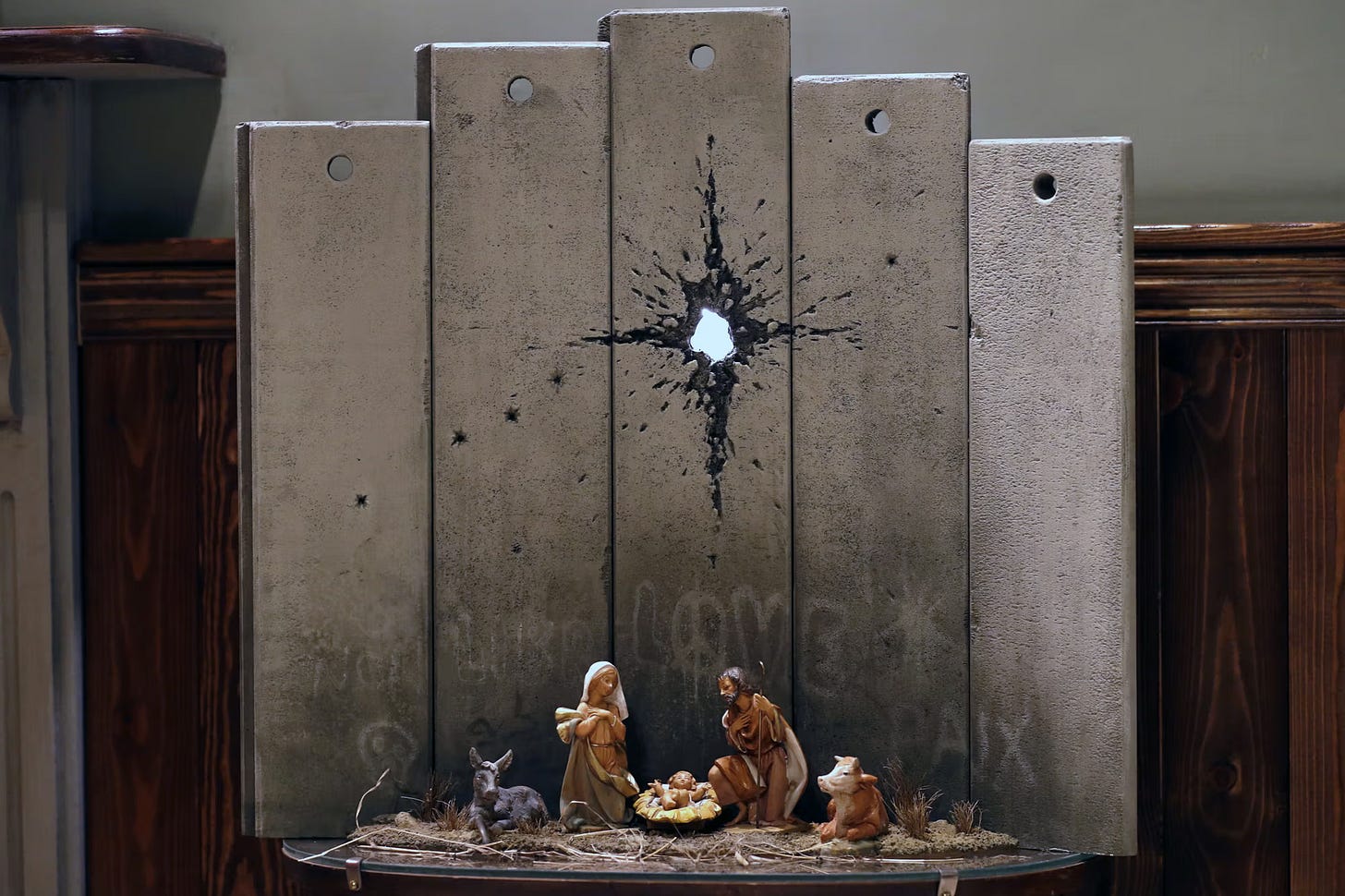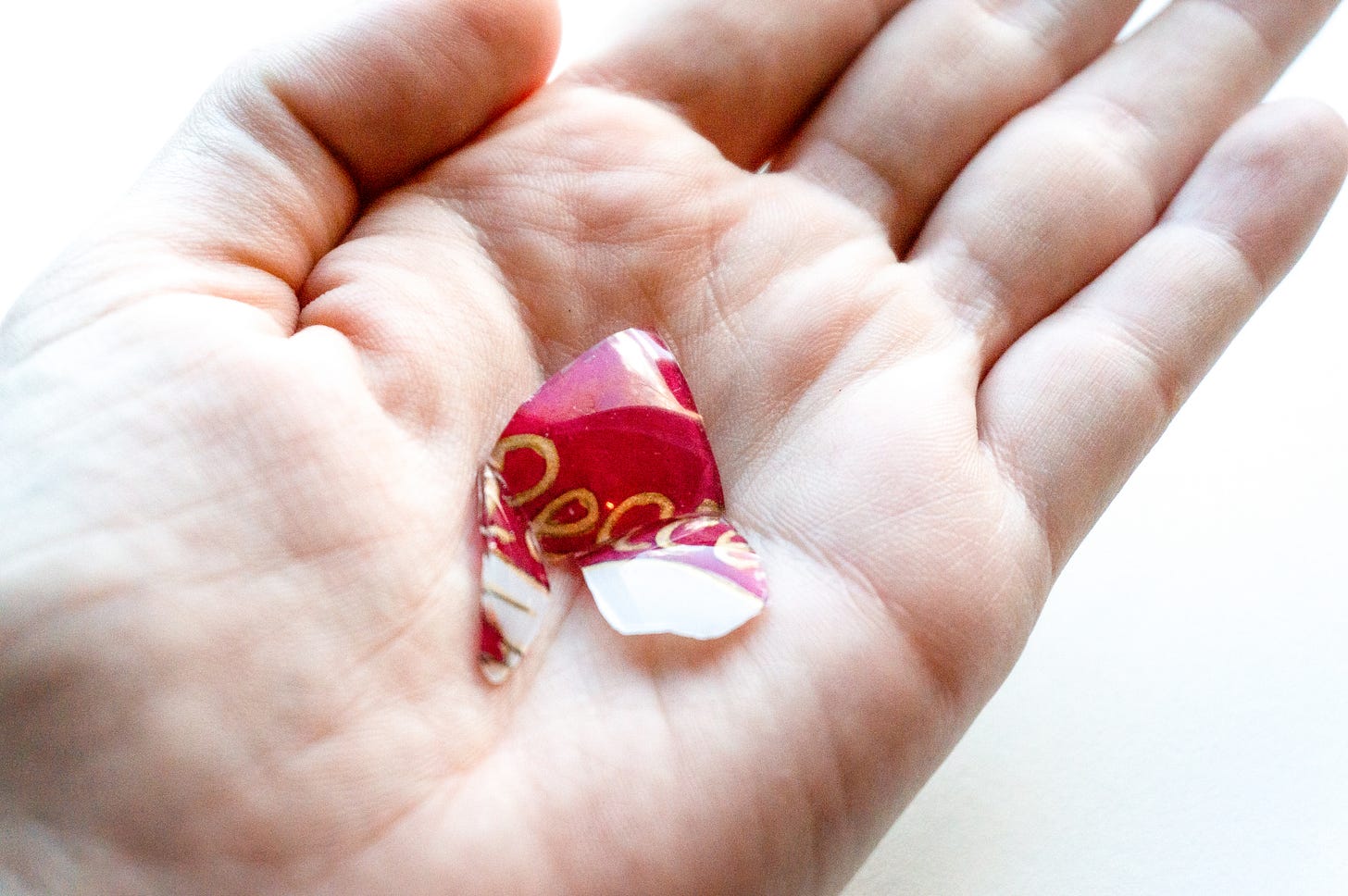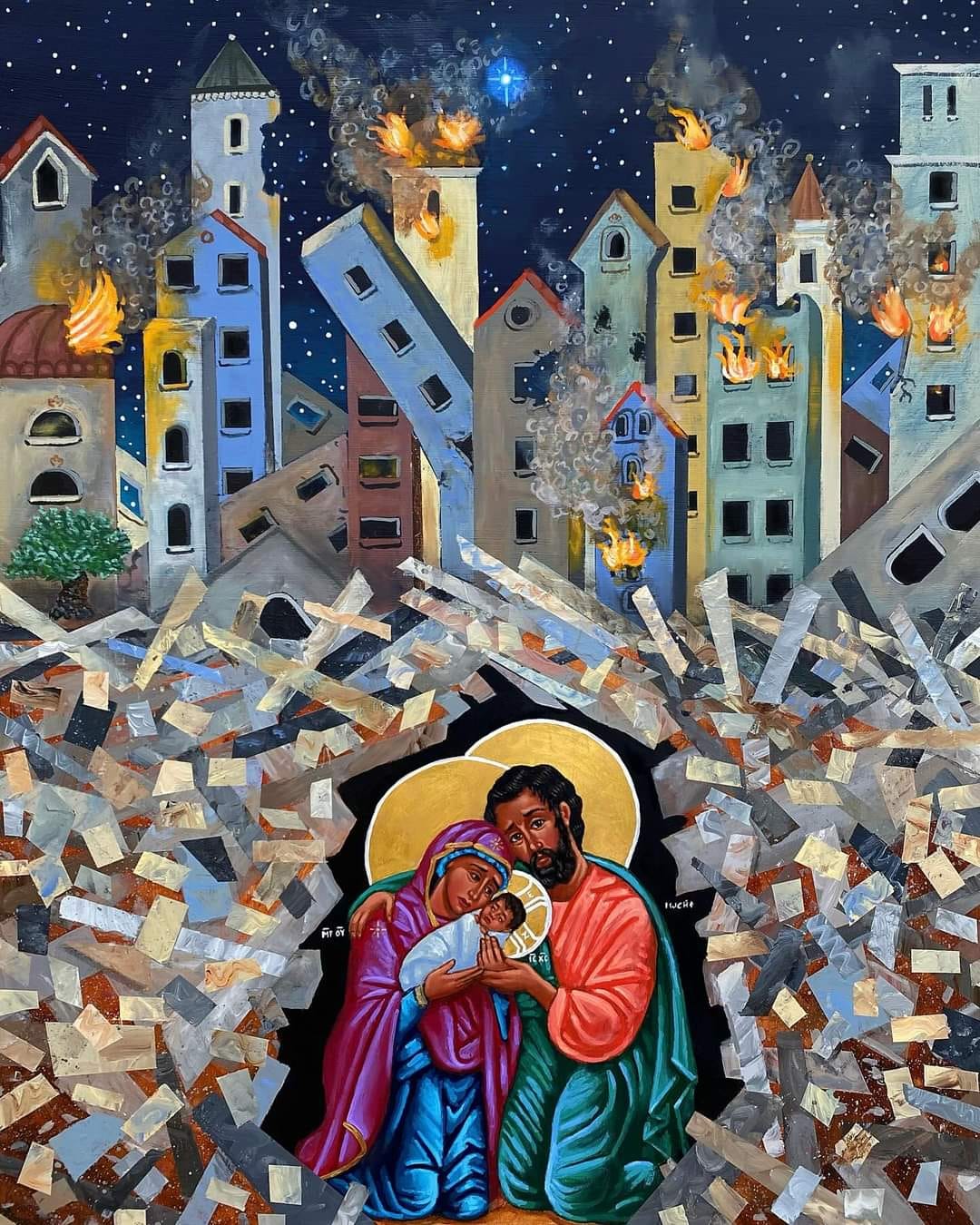
I was recently reminded to order my Christmas cards before it was too late to pull together photos and write up a paragraph on our year. Something in me sunk when I considered the task. Aren’t Christmas cards supposed to be light and cute? Smiling photos. Travels and successes. Plans for what’s next. What even IS next?
It’s not that nothing good happened in 2023, it’s that I’m allergic to faking that everything’s okay right now when clearly so much is not in this season of not merry and not bright and not holy and not hopeful. It’s been both/and all year long. Celebration and weeping. Lightness and losing. Hope and anguish.
Thinking of mailing out cards, I picture interrupting your day with a photo of my husband and I with Prudence, our once alive dog, and letting you know we lost so many things this year and I have Gaza on my mind, but hey, I went on four big trips and made some cool stuff too. #blessed isn’t the vibe this December.
So I’m taking to Wandering Home where I’ve carved a space for us to be curious, creative, and authentic this paradoxical kinda Christmas. In lieu of a polished card, I’ve decided instead to offer this artful meditation on peace.
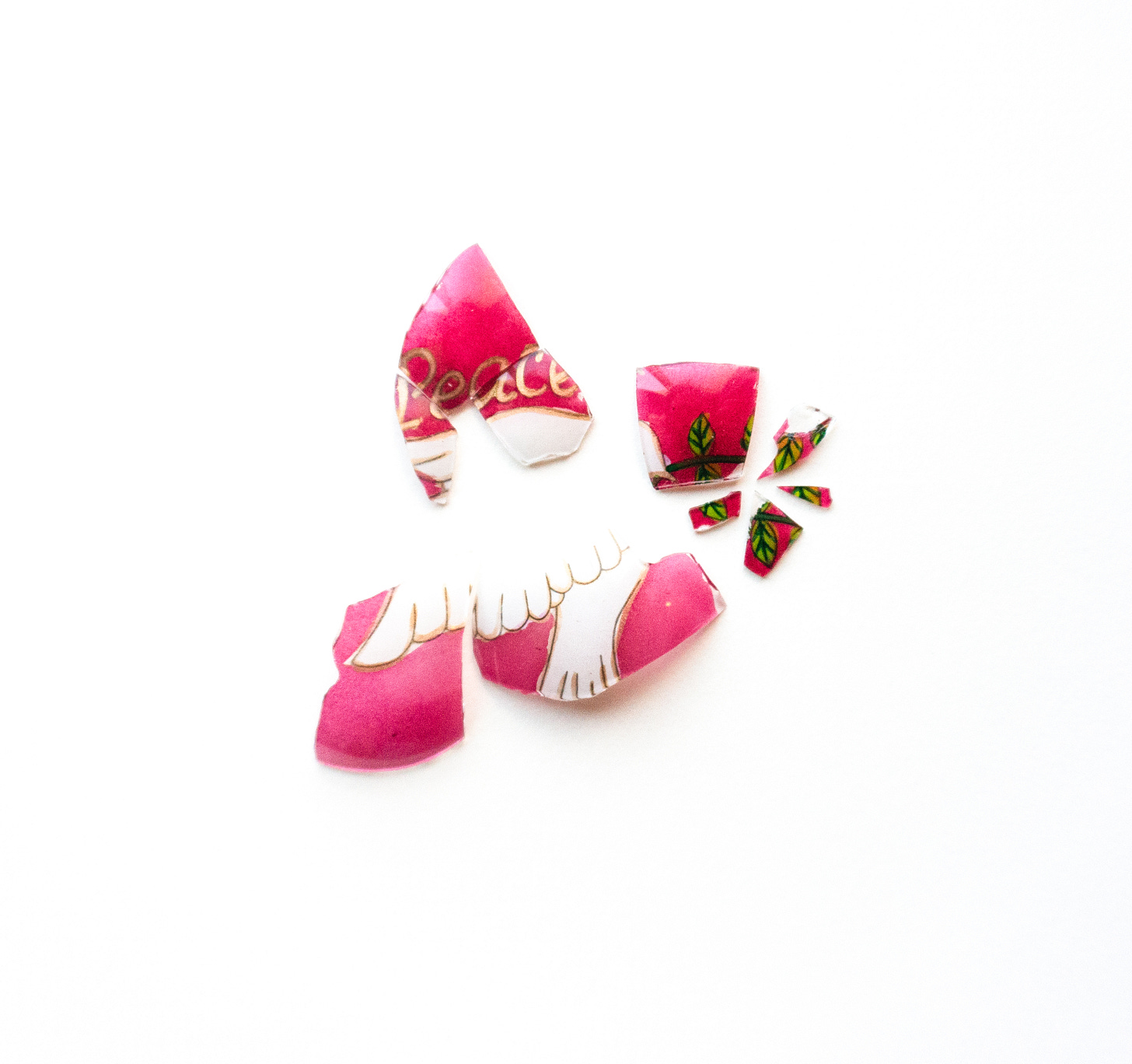
This Christmas I am waiting on hope through my weariness. Much of that weariness stems from having my eyes glued on Gaza for the past few months on the heels of returning from my volunteer trip to Lebanon and Jordan to serve Palestinian refugees. There was little time to recover before it was time to ramp up again. The work has been ongoing but remains urgent given the circumstances in Gaza, and the way I hold myself accountable to tell and show my community (that’s you) what I know. I have to endure and keep going.
Also it has me thinking a lot about peace. Peace amidst watching a genocide live on social media and begging the U.S. government to stop funding the terror without much success. Peace alongside integrating my recent trip and experiences, and finding ways forward on new paths rather than familiar ones. Peace in a time of families I love being ripped apart, and losing loved ones, and waking up to new levels of understanding of the systems that made our world so incredibly unsafe for the most vulnerable. In other words, peace hasn’t been easy to make or find. Unrest? Yes. Weariness? Of course. Grief? Absolutely.
To counter some of the upheaval, I've all but demanded the tradition and security of my family Christmas for a little normalcy, a little something to count on in a year that relentlessly reminded me to count my blessings and mercies because they too can flee, change, be lost, or die.
This season holds more than just Christmas celebration traditions with family for me. Advent, the month leading up to Christmas in anticipation of the birth of Jesus, is one religious moment that has become less complex and tender with my walk out of church a few years ago, even though the way I observe is less church body commitment and more personal, embodied experience. I still deeply resonate with looking for hope in darkness, pointing others to what I find, and anticipating lightness in the midst of such heaviness. I am reminded that the rituals and practices and songs have gone on long before us and will continue long after us, meaning I am free to step in and out of the tradition according to what feels right and true for me.
Instead of reminding me of the church community I lost, Advent this year is reminding me that I’ve not lost hope. I’ve simply lost the ability to ask for peace on earth that doesn’t include justice and peace for Palestinians, to remember who’s under the rubble.
I hear this ringing around the world this time. Rev. Dr. Muther Isaac, a Palestinian Lutheran pastor, says Christmas in Bethlehem is canceled. Churches around world are hosting Christmas Ceasefire Services. Many churches in Jordan and Lebanon have cancelled Christmas festivities altogether amidst the violence on their doorsteps, and out of respect and mourning. Marches and protests carry on around the globe even through the snows of late autumn in the Northern Hemisphere. General strikes are carried out while we’d rather be shopping for presents and sipping a Starbucks Caramel Brulée Latte. Boycott Divestment and Sanctions (BDS) is in full effect and pressuring corporations to rethink their values and contributions to the genocide. Yemen is forcing shipping reroutes around Africa to interrupt arms and goods to be delivered to Israel.
I think we’re getting it, there just needs to be more of us getting it, and for our governments to say “enough is enough”, as we the people have. When voices are loud but going unheard, I turn to the medicine of art to make sense of the paradox.
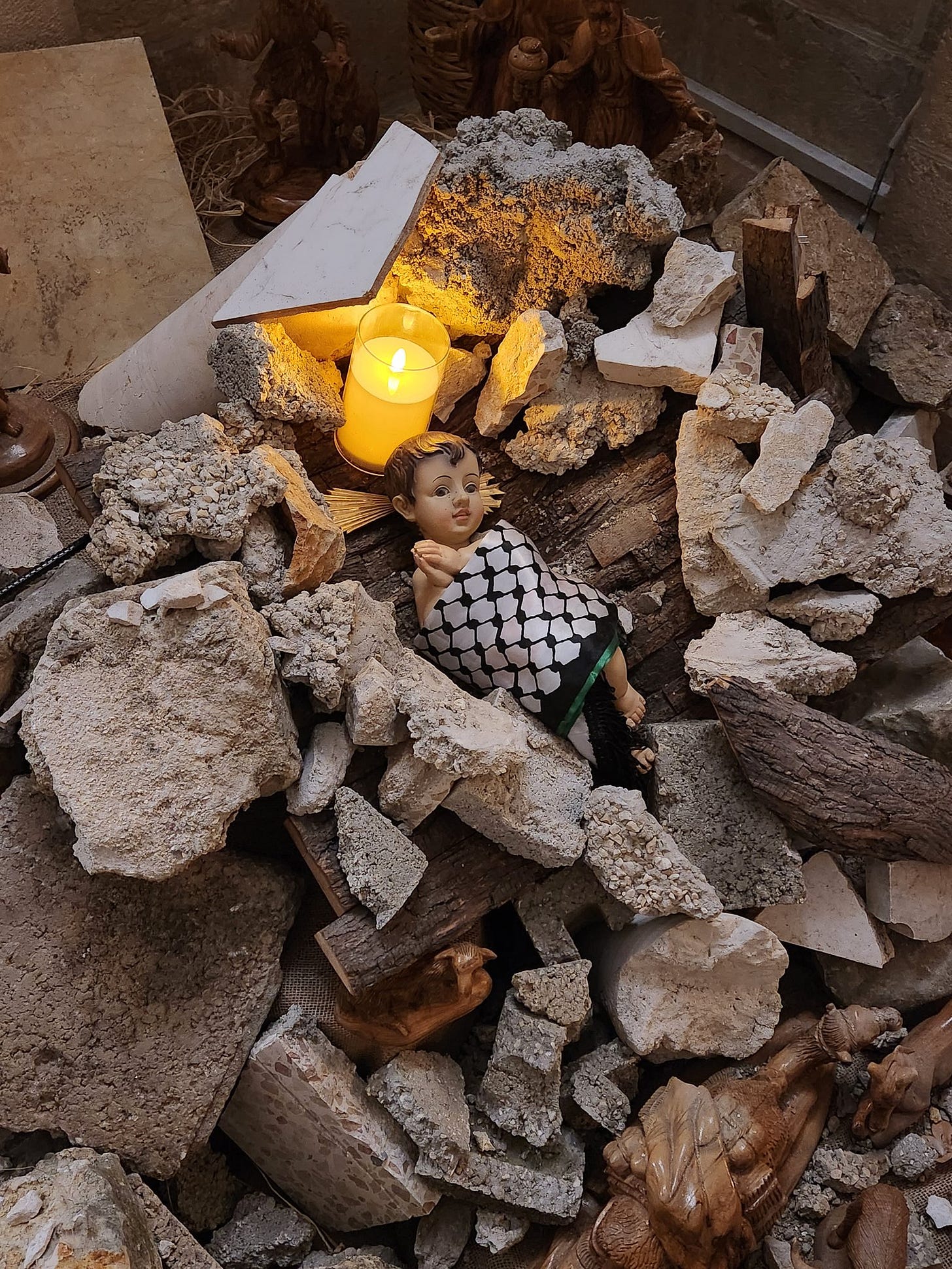
The nativity scene at the front of the sanctuary of the Christmas Lutheran Church in Bethlehem shows a child wrapped in a Palestinian kuffiyeh in a tumble of broken cement and destruction. Mary, Joseph, and the wise men, on the edges of the bombardment, are searching for him under the rubble.
On December 3, 2023, Rev. Dr. Muther Isaac posted the above image and wrote: “Christmas in Palestine this year. The Child under the rubble. Immanuel God is with us in our pain and suffering. God in solidarity with the oppressed. The child of Bethlehem is our hope. For the children of Gaza and all victims of wars.
In Gaza today, God is under the rubble. He is in the operating room. If Christ were to be born today, he would be born under the rubble. We see his image in every child killed and pulled from under the rubble. In every child in incubators. Manger at Christmas Lutheran Church Bethlehem.”In a follow-up post, he wrote: “This manger points to the painful and horrifying reality that exists in Gaza today, where a child is killed every 15 minutes, and thousands have been already killed, and millions have lost their homes and are currently displaced. … At Christmas, we are reminded that Jesus was born on our side of the wall.”
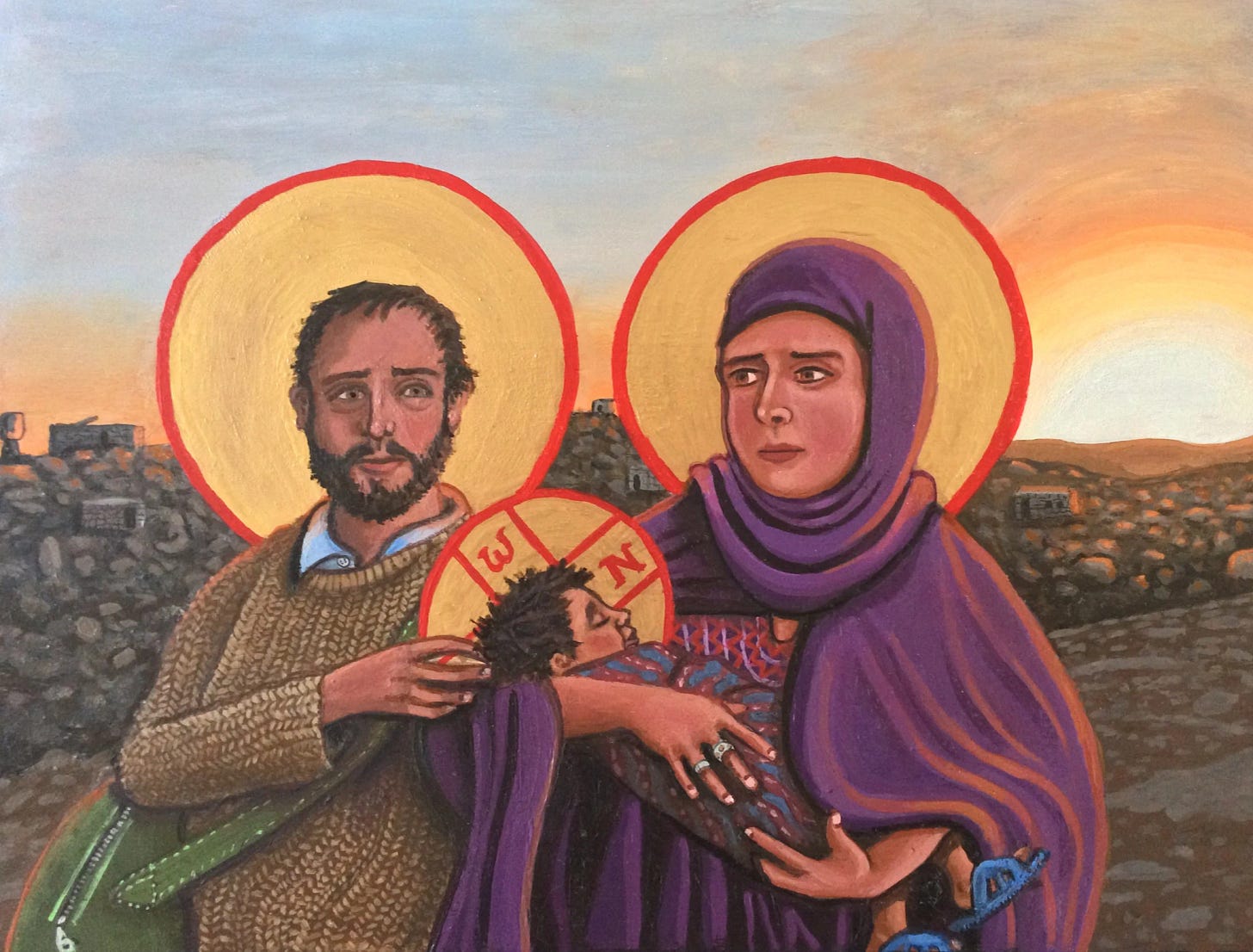
The holy family of Mary, Joseph, and Jesus, who were Palestinian and Jewish, were refugees, fleeing violence and infanticide. Picture them today. If they lived in the occupied West Bank, they are (at best) second class citizens.
As Palestinians, they encounter discrimination and violence from settlers who live in settlements around the West Bank, and the threat of unwarranted raids and imprisonment without trial by the Israeli Occupation Forces hangs over their heads every day and night. A Palestinian cannot travel from Bethlehem to Nazareth without a military permit, and the separation wall cuts them off from their family, land, and holy sites. The journey takes hours to cross the checkpoints and use the Palestinian-only transportation and roads, but it’s only 70 miles as the crow flies, or about four days’ journey on foot or donkey in Jesus’ time.
As Jews, the holy family would have had the highest level of status a Palestinian family could have, but it would still be lower than Jewish Israelis. This is the Israeli apartheid in action. A person’s level of privilege or status depends on their ethnicity, not where they were born or the religion they practice. Israel serves one ethnic group (Jews) at the expense of another (Palestinians.)
Imagine if the holy family lived in Gaza today. Mary, still expecting, is fleeing their home on foot, as 90% of Gazans have been forced to do since October 7th. They likely have no water or food or medicine, and Mary will be nursing her baby – if he even survives delivery – until her supply dries up due to malnutrition. Joseph is digging for their martyred relatives with his bare hands, his cuticles beaten back to the knuckle, after an indiscriminate bomb lands on their multi-family apartment. They have nowhere to go. Nowhere safe to be. No one to prepare him room. Not even their brothers in the faith can keep them safe, because they’re facing the same realities.
Around 200,000 Palestinian Christians live in Palestine today. Only 1,000 lived in Gaza before the Gaza Genocide, so it’s hard to say how many have lived to see Christmas this year amidst the bombings. Palestinian Christians face oppression and inequities under apartheid as does any other religious group in occupied Palestine.
What’s appalling to me is how easily the Western Church forgets their existence, unable to call them “brother” and “sister” for their ethnic and national heritage, though many are descendants of the first Christians in Palestine. My friend Daniel, who is a Palestinian Christian from a town near Bethlehem called Beit Sahour, jokes Jesus was his cousin. It’s honestly not far-fetched. We’re talking about the birthplace of a faith and Christ that is but 2,000 years old.
How can we celebrate liberation through Jesus’ message, or the derivatives that have become “Christmas” as we know it, while the homeland where he was born, lived, preached, healed, and died, are under blockade, bombardment, occupation, and continued genocide?
So what do we make of Advent this year? What goes on the Christmas card?
All I’ve got are questions. Do we take seriously our responsibility and opportunity to champion peace through nonviolent means, to uplift those doing the same, and to be a light in a dark, dark world? Especially as we sing “peace on earth” and “o holy night” and “o little town of Bethlehem” this week.
I believe we have a responsibility to persist with clarity, courage, and a continued commitment to building the better world we want to live in. Not just for ourselves – but for all of us – because our freedom hinges on everyone being free. In the way that a military occupation doesn’t help create safety for Palestinians or Jews, now or 75 or 2,000 years ago, the systems I benefit from that subjugate or harm you do not keep me safe. They do not offer me true peace. This Christmas, I’m sharing about injustice on my mind as I continue with purpose and dedication to building a world free of the ideas and conditions that necessitate, invite, fund, and excuse war and colonization.
I’m not saying there should be no Christmas. I think the beauty of observing Advent in anticipation of Christmas is that we realize year after year that it always comes, even when it feels like it can’t or even shouldn’t. But I see you if you’re tired and can’t do it this year. I see you if you want to hold tradition in one hand and resistance in the other. I see you who feels like taking a break from work or the news smacks of privilege and insensitivity. I see you whose season is marked all over with tension instead of tinsel.
What I’m proposing is that we take some time to reflect on the past year – all the paradoxes of this bewildering time of rebirths and reversals and rubble and waiting on hope through the weariness – to find what we need to recharge in order to keep making justice and embodying peace.
If there is a Prince of Peace, he is born under the rubble in solidarity with Gaza. Christmas is cancelled, and yet, it goes on. God is under the rubble, and so it is.
That’s the Christmas card.
Until peace on earth,





